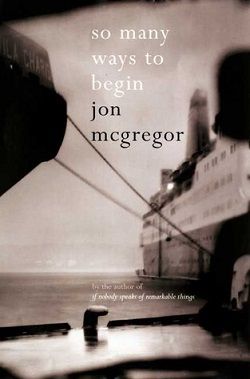Summary

So Many Ways to Begin
by Jon McGregor
David Carter, the novel's protagonist, takes a keen interest in history as a boy. Encouraged by his doting Aunt Julia, he begins collecting the things that tell his story: a birth certificate, school report cards, annotated cinema and train tickets. After finishing school, he finds the perfect job for his lifetime obsession as curator at a local history museum. His professional and romantic lives take shape as his beloved aunt and mentor's unravel. Lost in a fog of senility, Julia lets slip a secret about David's family.
Over the course of the next decades, as David and his wife Eleanor live out their lives - struggling through early marriage, professional disappointments, the birth of their daughter, Eleanor's depression, and an affair that ends badly, David attempts to physically piece together his past, finding meaning and connection where he least expects it.
.
Read
So Many Ways to Begin on http://kissnovel.net
Martial Peak Reviews
Jon McGregor's So Many Ways to Begin is a poignant exploration of memory, identity, and the intricate tapestry of human relationships. The novel centers around David Carter, a boy with an insatiable curiosity for history, nurtured by his loving Aunt Julia. This relationship serves as the emotional backbone of the narrative, as David's journey through life is intricately linked to the artifacts he collects—each piece a fragment of his past, a testament to the stories that shape him.
From the outset, McGregor's prose is rich and evocative, immersing readers in David's world. The act of collecting—be it birth certificates, school report cards, or train tickets—becomes a metaphor for the human desire to hold onto the past. David's role as a curator at a local history museum is not just a job; it symbolizes his quest for understanding and connection. McGregor deftly illustrates how our personal histories are often intertwined with the broader narratives of our families and communities.
As the story unfolds, we witness David's life through the lens of his relationships. His marriage to Eleanor is fraught with challenges, reflecting the complexities of love and partnership. McGregor does not shy away from depicting the darker aspects of their union, including Eleanor's struggles with depression and David's infidelity. These elements add depth to the characters, making them relatable and human. The author’s ability to portray the nuances of their relationship is commendable; he captures the oscillation between love and disappointment, hope and despair, with remarkable sensitivity.
Aunt Julia's decline into senility introduces a poignant layer to the narrative. Her slip of a family secret acts as a catalyst for David's introspection and drives the plot forward. This revelation not only complicates David's understanding of his own identity but also serves as a reminder of the fragility of memory and the impact of time on our relationships. McGregor's exploration of memory is particularly striking; he illustrates how the past can haunt us, shape us, and sometimes elude us altogether. The interplay between memory and history is a recurring theme, prompting readers to reflect on their own lives and the stories they carry.
McGregor's character development is masterful. David evolves from a curious boy into a man grappling with the weight of his choices and the legacy of his family. His journey is marked by moments of clarity and confusion, love and loss. The author skillfully navigates the complexities of adulthood, portraying the struggles that many face as they seek to reconcile their past with their present. David's attempts to piece together his history resonate deeply, as they reflect a universal quest for meaning and connection.
Another notable aspect of So Many Ways to Begin is its exploration of the passage of time. McGregor captures the ebb and flow of life with a keen eye, illustrating how moments of joy and sorrow are often intertwined. The narrative spans decades, allowing readers to witness the evolution of David's relationships and the impact of external events on his life. This temporal breadth adds a layer of richness to the story, as it mirrors the complexity of real life, where beginnings and endings are often blurred.
In terms of style, McGregor's writing is lyrical and contemplative. His prose invites readers to linger on the details, to savor the moments that define David's life. The author employs a reflective tone that encourages introspection, making the reading experience both immersive and thought-provoking. The pacing of the novel is deliberate, allowing for a deep exploration of themes without feeling rushed. This measured approach enhances the emotional weight of the narrative, drawing readers into David's world.
Comparatively, McGregor's work can be likened to that of authors such as Julian Barnes and Anne Tyler, who also delve into the intricacies of memory and relationships. Like Barnes, McGregor examines the interplay between personal and collective histories, while Tyler's focus on family dynamics and the everyday struggles of life resonates with the themes present in McGregor's narrative. Both authors share a commitment to exploring the human condition with empathy and insight, making them kindred spirits in contemporary literature.
Ultimately, So Many Ways to Begin is a profound meditation on the nature of memory, identity, and the connections that bind us. McGregor's ability to weave together the threads of David's life into a cohesive and compelling narrative is a testament to his skill as a storyteller. The novel invites readers to reflect on their own histories, the artifacts they collect, and the stories that shape their identities. It is a book that lingers in the mind long after the final page is turned, leaving an indelible mark on the heart.
In conclusion, Jon McGregor's So Many Ways to Begin is a beautifully crafted exploration of life’s complexities, marked by rich character development and a deep engagement with themes of memory and identity. It is a must-read for anyone who appreciates literature that resonates on both an emotional and intellectual level.
























Reviews 0
Post a Reviews: